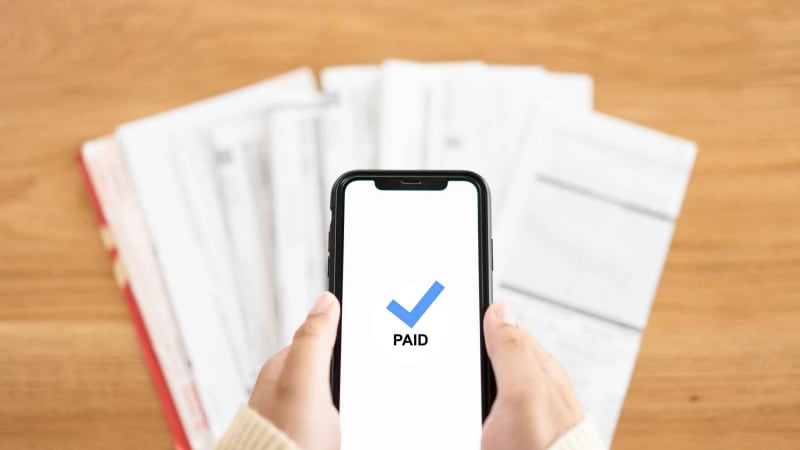Should I pay my credit card off in full?

You finally used your credit card for a big purchase you've had your eye on, but now you're wondering if you should pay your credit card balance off in full. Generally, it's best to pay off your credit card balance before its due date to avoid interest charges that get tacked onto the balance month to month. An important rule of thumb is to only charge what you can afford to pay off each month. By showing lenders that you're a responsible borrower, you may be able to boost your credit score and eventually, can take on other lines of credit.
What is a credit card balance?
In simplest terms, a credit card balance is the total amount of money that you owe. Your balance is calculated by adding up the charges you made using the credit card, in addition to any accrued interest, late payments, foreign transaction fees, annual fees, cash advances and balance transfers. It will also show any payments or statement credits that have been made to your account.
When you make a purchase using your credit card, the balance increases. When you make a payment, the balance decreases. Any amount that's left at the end of the billing cycle is carried over to next month's bill. Credit cards charge interest on unpaid balances, so if you carry a balance from month to month, interest is accrued on a daily basis. Your credit card balance isn't a fixed amount every month — it can change depending on how much you've charged to your account and the payments that you've made, in addition to interest.
There are a few ways to find your credit card balance, but the simplest way is by logging into your account online or through your card issuer's app. It will show your current balance and statement balance, along with the minimum payment that you're required to make. You can also find your credit card balance by calling customer service.
How do payments on a credit card work?
When paying off your credit card, you have the option to make the minimum payment due or pay more than the minimum. The minimum payment is the portion of your balance that you're obligated to pay monthly. You're typically advised to make more than the minimum payment to help you pay off your balance faster and to reduce your credit utilization ratio, as well as avoid accruing interest.
Convenient credit card payment options include:
- By mail
- Online
- Mobile app
- Automated phone service
- ATM or branch
Some payment methods may result in a fee. Depending on your method of payment and the time of day you submit your payment, it may be credited and posted as a transaction on your account the same day that the bank receives it or the next business day.
According to the law regulated by the Consumer Financial Protection Bureau, payments received by 5 p.m. must be credited the same day. Your due date isn't the only time you can make a payment. You can also pay your bill early or make multiple payments each month, depending on the card.
Is it better to pay off your credit card in full?
Here's a rundown of the pros and cons of making full payments on your credit card instead of just paying the minimum:
Pros of paying your credit card off in full
- No interest charges on your balance: Most credit card issuers charge interest or APR if you carry your balance over to the next month, which means you're paying interest on top of the unpaid balance you owe. You'll avoid paying interest if you pay your credit card balance off in full each month by the due date.
- Establish a better credit score: Using your credit card and repaying your balance will help you establish a good payment history. When you pay your credit card balance in full, your credit score may improve, which means lenders are more likely to accept your credit applications and offer better borrowing terms.
- Potential increase of your credit limit: Eliminating your balance each month shows that you're capable of managing your debt and may increase your likeliness of getting a credit limit increase.
Cons of paying your credit card off in full
- May be costly: If your balance is high, then it might seem difficult to pay it off in full. A full payment could be costly, but it may be better to pay it off before it accumulates even further.
How credit card balances impact your credit score
Your credit card balance is an important factor that helps make up your credit score. Credit scores are looked at by creditors to determine the risk of granting you additional credit. If you regularly use your credit card to make purchases but repay it in full, your credit score will most likely be better than if you carry the balance month to month.
Your credit utilization ratio is another important factor that affects your credit score. Credit utilization is the difference between how much you owe on your credit card and how much your total credit card limit allows you to spend.
Lower credit utilization shows that you're a responsible borrower and you don't have high credit card balances. The key is to keep your balance at or below 30 percent of your credit limit to help improve and maintain a good credit score, which means having no balance at all is even more helpful. Always try to pay off your credit card in full when possible.
Now that you've found some new strategies to pay your credit card off in full, you'll find that managing your credit card may only take a few well-thought-out steps.
Chase Sapphire is an official partner of the PGA Championship.



